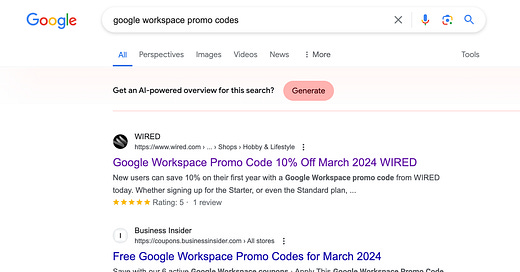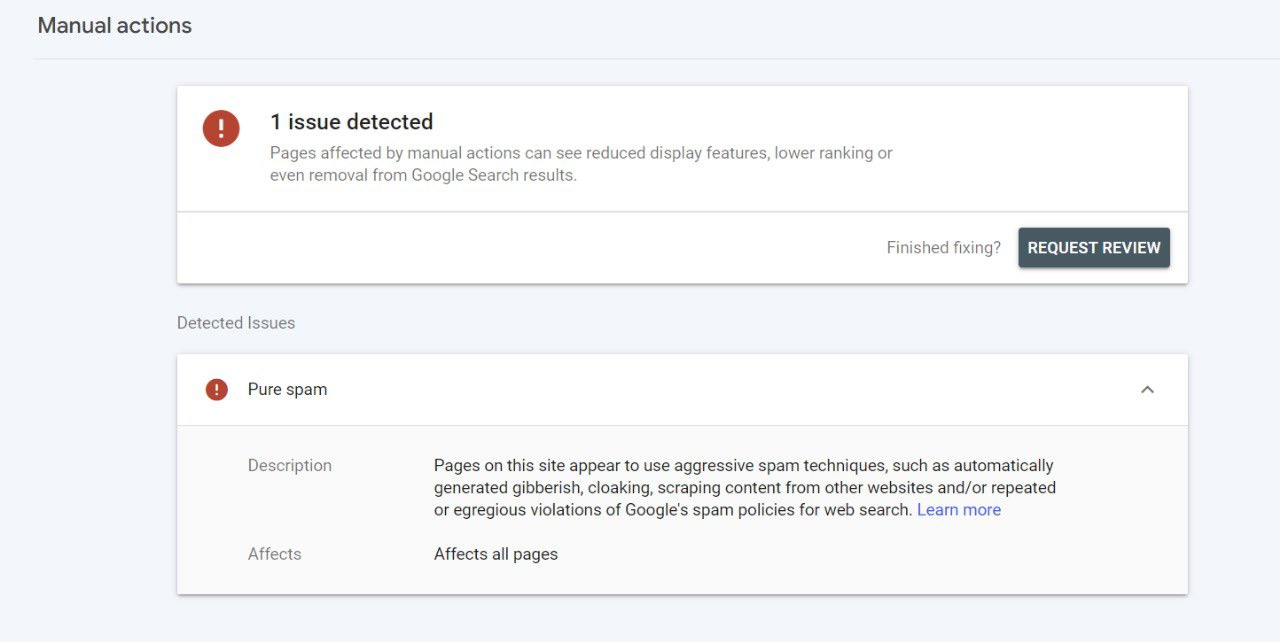This week’s newsletter is sponsored by the Digital PR agency Search Intelligence, which uses PR methods to grow a link portfolio and North Star Inbound, which is a recommended agency for penalty recovery. See their case studies linked in the newsletter.
I want to address the recent Google algorithm update without delving into the nuances of winners, losers, features and loopholes. Changes in search engine algorithms are a necessary part of search, and if they didn’t exist, this would not be a channel that any of the participants (users and websites) would enjoy.
March 5th update
I am certain that once Google’s update is fully analyzed, it will be determined not to be effective enough, which is an impossible goal, as I will explain below, and therefore, a guarantee that there will be future updates. If a site survived this update, it is not guaranteed to survive the next one.
Every time there is a rumor of a Google algorithm update, a general panic ripples through the community of people reliant on free traffic from Google’s search users. There is a collective holding of breath while the numbers are analyzed, and then there is a sigh of relief (hopefully) when they survive the algorithm update unscathed.
[SPONSORED by Search Intelligence]
This campaign landed massive organic links in Timeout, Express, and lots of other big outlets.
This is exactly how we’ve done it:
💡 Campaign name: Easiest European countries to gain citizenship
✅ We studied the latest Eurostat immigration data from 2009 to 2021.
✅ We wrote up an email report outlining our findings:
Sweden is the easiest, followed by Norway, and the Netherlands.
This campaign got us over 15 non-syndicated links, including massive ones such as Timeout, Express, and…
(Note: Bing and other global search engines also have algorithm updates, but since many sites get most of their search traffic from Google, it is Google updates that become the most newsworthy.
Algorithm pain prevention
The way to innoculate against Google or any search engine algorithm update is not to have the most bulletproof strategy but instead to ignore the algorithms almost entirely. This might be novel, but it works for the largest companies.
By focusing solely on building for the user (with some nuances on search engine bot best practices), you are certainly building in the direction the search engines want to be. While in the near term, you might not “win” as much search engine traffic as you had hoped for, in the long term, you will win as the search engines catch up.
This is a core focus of my book, Product-Led SEO. Obviously when I wrote my book, I could never have predicted the rise of LLM’s or any of the specific features of search engines today, but the principles remain. If you build a product for users, you are aligned with the search engines, whereas if you build a strategy that seeks to take advantage of search engine loopholes, those loopholes could and will close.
Understanding algorithm updates
The idea of an algorithm update and how one should approach it is certainly the same for all existing search engines and likely for all search engines that might eventually be unleashed on the world.
After the update is released, and especially if Google confirms it, a slew of articles and pundit analyses attempt to dissect what it is that Google changed and how to win in the new paradigm. In my opinion, all of this angst is entirely misplaced.
The Google algorithm is made out to be some mystical secret recipe cooked up in a lab designed to simultaneously rob and reward sites at the whims of a magical all-knowing wizard. In this outdated schema, the goal of every SEO and webmaster is to dupe this wizard and come out on the winning side of every update. The idea is rooted in a fundamental misunderstanding of what happens in a Google algorithm update—and a fundamental misunderstanding of Google.
The need for algorithm updates
Google wants to ensure an effective user experience for the searcher—nothing more. It is not a wizard; its system is not meant to arbitrarily rob and reward sites.
Google’s algorithms are extensive and complex software programs that constantly need to be updated based on real scenarios. As search engineers find anomalies, the variations are patched in a process similar to how bugs would be reported and fixed in any other software program. In every other company, updating a core program is merely called “a bug fix,” but in search, the “fix” translates to an algorithm update, which often goes unnoticed.
In any software company, there are also large product updates that happen multiple times per year. Changes are always made to the product, some visible and others not. For example, Facebook is constantly tweaking all aspects of its news feed. Meta didn’t just invent the idea of a news feed many years ago and leave it. Our phone operating systems, on Android or iOS, are updated in major ways at least once per year.
In Google’s case, marketers and even spammers move in lockstep to improve their best practices as their algorithms advance; therefore, there will always be a dance between Google and those looking to take advantage of Google. To keep Google providing the most effective results for users, Google has to improve its algorithms continuously.
There are a lot more ‘spam’ sites
More recently, reputable sites have even taken advantage of these loopholes, and Google is warning them that this is no longer kosher. Search for anything + “promo code”, and you will see many authority sites that do not deserve to be on this search result page.
In Google’s eyes, this bug needs to be fixed, and they will fix it with an algorithm update.
Look at this search as an example; these news sites are using their reputation to appear on a search outside of their specialties.
Like any other software company, Google releases updates that make big leaps forward in its products and services. However, in Google’s case, these are called “major algorithm updates” instead of just product updates. The choice of words alone is somehow enough to induce panic attacks.
What occurred in the last two weeks was a major update because Google bothered to tell the world about it. This means they wanted this announcement to put spammers on notice to reform their behavior and let the “losers” in this algorithm update know what happened.
Search engines are a seesaw, so if one site loses, another certainly gains. While the losers lose on an individual basis, the collective search engine audience will ideally benefit from better search engine results. As users, we want algorithm updates to happen frequently.
Google is not out to punish and control the Internet but to improve the platform for everyone who seeks information. Make that your paramount goal as you craft your SEO strategies.
TL;DR
Many of today’s tactics will become obsolete as search engine technology advances. Focusing only on tactics risks dramatic shifts in traffic when the rules change. Focusing on users will sustain all platform changes (even a migration away from search engines) as long as the users still exist.
[Sponsored by North Star Inbound ]
Are you frustrated with a sudden drop or erosion of traffic with no end in sight?
You must act FAST!
Because if you haven’t fixed what’s caught Google’s ire, you’ll sink even lower the next time.
And that time…IS NOW.
The March Core Update is here. And Google is not messing around.
Google is rolling out Manual Penalties and deindexing ENTIRE SITES in just the first 2 days.
This looks due mainly to AI spam.
But if you were previously hit by HCU, you must be ready..
I’d love to take a look.
We’ve helped dozens of brands recover their traffic, often reaching new highs–even after months of trying “everything”.
Get a 360-view of what’s gone wrong AND a prioritized plan for addressing it.
Contact us here to get yours today.






Well said Eli. The frantic pursuit of SEO's for news about updates and the endless speculation about how this Google update will turn out is starting to become tiresome. You're giving the best advice by ignoring the updates and stick to the age-old principles that Google has been preaching since time immemorial. It's all about the users.
I’m a content writer and generally ignore updates and focus on creating useful, unique content that helps my clients’ target users. I think nowadays, it’s not just about making your content more thorough than the SERPs, but also personalizing it with anecdotes/quotes from users, employees, and industry experts, adding proprietary data when you can, and really anything else that’s impossible to replicate. I’m an on-page SEO, so your posts help me keep up with the technical bits — thanks!